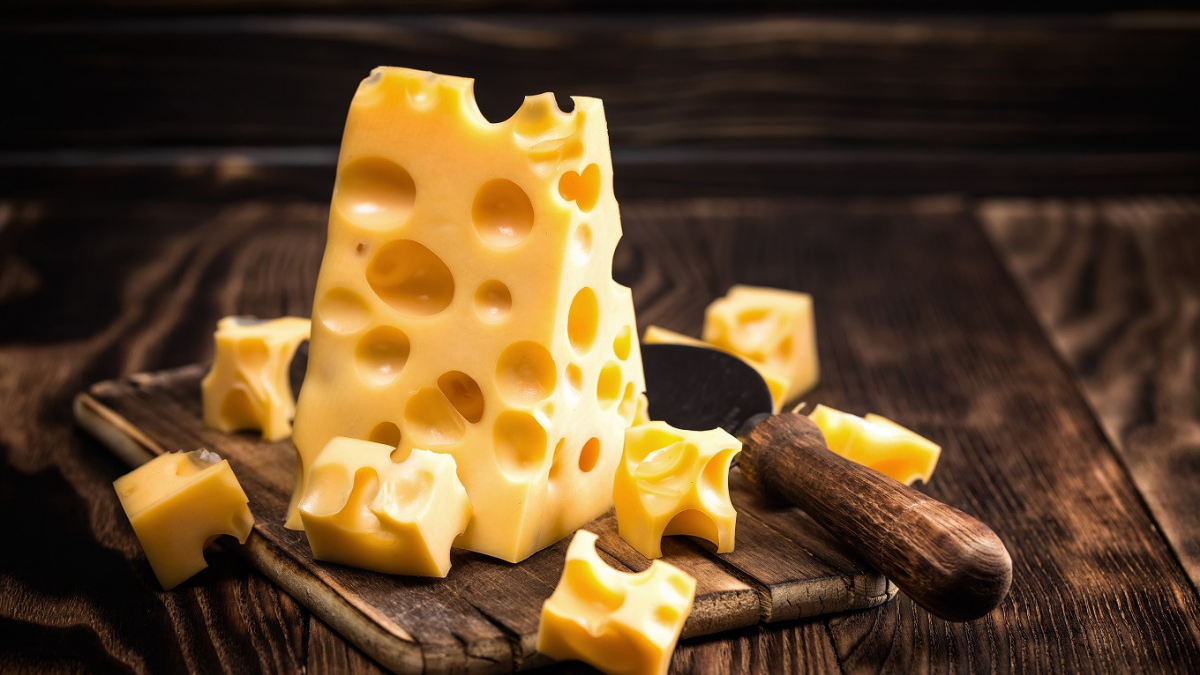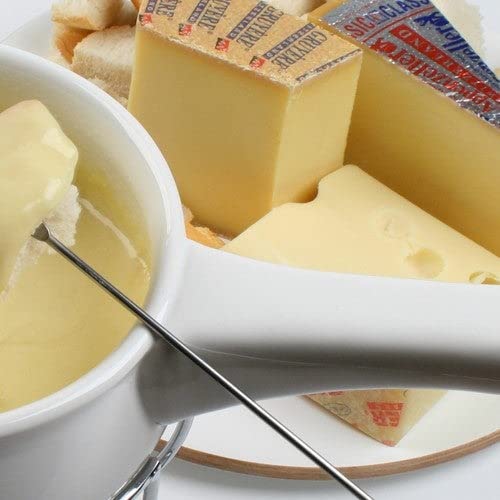On the other hand, Swiss cheese is a pale yellow, slightly hard cheese created from cow’s milk in the United States. Emmental cheese from Switzerland served as inspiration. This cheese is recognized for its characteristic holes and harsh flavour caused by bacteria. It has several nutrients, yet you may ask if it is healthful. The advantages and disadvantages of Swiss cheese are discussed in this article.
There are a few things to keep in mind when eating Swiss cheese. Swiss cheese contains fat, salt, and lactose, which may be harmful to some people if taken in excess. Because swiss cheese has more sodium and fat than other cheeses, it may increase the risk of high blood pressure and cardiovascular disease. Lactose-intolerant individuals should also avoid Swiss cheese. Because cheese, like other milk and dairy products, contains lactose, lactose intolerance sufferers may have diarrhea, stomach pain, or severe bloating after eating it.
Swiss Cheese Nutrition Facts
Swiss Cheese’s Health Benefits
The American version of Swiss cheese is based on the Emmental cheese from Switzerland, which features noticeable holes known as “eyes.” It’s not the same as conventional Emmental because it’s prepared without the rind and has a milder flavour. Cheese curds are produced by fermenting cow’s milk with a bacterium. Water is removed from the curds, then squeezed together and supplemented with salt and another bacteria strain.
After then, the mixture is left to mature until it is ready to consume. Lactose, or milk protein, is broken down by bacteria into lactic acid, and this process influences the composition and flavour characteristics of the cheese. Swiss cheese is a semi-hard cheese that keeps its shape well at high temperatures. Sandwiches, burgers, pastries, omelettes, pasta, and fondue all benefit.
Bone Wellness
Swiss cheese contains protein and calcium, which help build stronger, healthier bones. Protein has been connected to the production and development of bones, and calcium also contributes to good blood flow and muscles and ensures the health of our bones.
Increases Muscle Mass
Swiss cheese has a high protein content. While protein is essential in our diets, it also has health benefits such as helping us gain muscle mass and increasing our power. Increased protein consumption has been linked to increased resistance training strength.
Blood Pressure Control
More research is needed to link swiss cheese and decreased blood pressure. However, one study discovered that cheese includes high levels of two antihypertensive peptides (protein components present in milk, eggs, and meat) that have been shown to reduce blood pressure.
Increases Metabolism
Protein also helps you prevent overeating and gaining weight by increasing your metabolism and decreasing food cravings.
High-protein foods, such as swiss cheese, have been demonstrated to reduce the number of calories burned and provide more energy, especially when compared to carb-heavy diets.
Is Swiss Cheese a Cholesterol Raiser?
Ali is also a published author. High LDL cholesterol, high blood pressure, and heart disease risk eating too much cholesterol or saturated fat. Because swiss cheese has more sodium and fat than other cheeses, it may increase the risk of high blood pressure and cardiovascular disease. In addition, a lactose-sensitive individual should avoid consuming Swiss cheese. However, cheese is high in cholesterol, and the USDA Dietary Guidelines from 2015 state no proven link between cholesterol-rich foods and blood cholesterol levels. The saturated fat in cheese, on the other hand, is what raises cholesterol levels.
Swiss cheese is low in fat and sodium, making it a simple addition to a healthy diet. Let’s go right to the point and highlight some of the Swiss advantages: Protein: Swiss cheese has 8 grams of protein per ounce, and compare that to 5 grammes of American cheese. Recommended. The researchers concluded that probiotics in Swiss cheeses lengthen lifespan by defending against pathogens, causing an anti-inflammatory effect on the immune system, and lowering stress reactions in the body.
Is it Possible to Lose Weight by Eating Swiss Cheese?
Cottage cheese is frequently advised for weight loss since it is high in protein but low in calories. Several studies have found that consuming high-protein foods like cottage cheese might boost feelings of fullness while also lowering overall calorie intake, perhaps leading to weight loss. Swiss is a fantastic lunch alternative to provolone and cheddar, which are higher in fat. To make a Cobb salad, chop up slices. Swiss cheese has a high vitamin A content while low in calories, fat, and sodium.
One ounce has 112 calories, 9 grammes of fat, and 53 milligrammes of salt. Cheese. Don’t rule out cheese just yet if you’re watching your weight. According to one study, having calcium-rich low-fat dairy in your low-calorie meals may help you lose weight while safeguarding your bone health. The most common source of belly fat is fatty meals like butter, cheese, and fatty meats. Correct! You replied: Excess calories of any kind, including high-fat foods, can enlarge your waistline and contribute to belly fat.
How Much Cheese can you Consume in a Single Day?
The American Heart Association recommends three servings of cheese per day, each serving weighing no more than 42 grammes. It also includes CLA, which may help raise HDL (good cholesterol) levels while lowering LDL levels (bad cholesterol). Although you should not have more than 40 grammes of cheese each day, a small amount with your soup is not ridiculous. Lactose, found in cheese and all other milk products, is difficult to digest for many people.
Eating too much cheese can result in bloating or gas for these folks. Furthermore, because cheese has no fibre, eating too much of it can cause constipation. Cheese is high in protein and calcium, but it also contains a lot of saturated fat and sodium. This means that consuming too much can increase your risk of cardiovascular disease by raising your cholesterol and blood pressure.
The high protein group lost 7% of their body weight, compared to 5% in the standard protein group, and their blood sugar, cholesterol, and triglyceride levels dramatically decreased. Furthermore, eating high protein, dairy-based snacks leads to better appetite control and a subsequent decrease in food consumption than high fat or high carb snacks. Adults should consume at least 0.36 grammes of protein per pound of body weight (0.36 grammes per kg) each day, around 55 grammes for a 150-pound person. Specific needs vary depending on your health, age, and activity (68 kg).
What is your Favourite Way to Consume Swiss Cheese?
Swiss cheese melts well, making it ideal for cheese sauces, sandwiches, and pasta. It’s frequently seen in omelettes with ham, savoury pastries, and stuffed into Chicken Cordon Bleu. Swiss cheese that has been somewhat aged goes well with fruit, nuts, and bread on a cheese platter. Because swiss cheese has a reduced salt level, you may serve it with salty sides and have a perfectly balanced cheese plate, as all cheese plates should be. Swiss cheese pairs well with cured meats like saucisson sec or prosciutto. Pretzels or sesame sticks offer a pleasant crunch to a cheese board and round it out.
Cheese can be eaten in various ways, including sliced, melted, crumbled, grated, baked, and even grilled. Of course, we all enjoy nibbles like cheese and crackers and colourful cheese boards brimming with toppings. Baby Swiss has a subtle nutty, sweet flavour that differs from muenster and brick cheeses in grilled cheese, but it has the same silkiness, meltiness, and elasticity. If you prefer a classic Swiss cheese flavour, Baby Swiss is your grilled cheese ally.
Is it Possible to Freeze Swiss Cheese?
For example, cheddar, Swiss, brick cheese, and blue cheese can be frozen, but the texture will typically turn crumbly and mealy, and they’ll also be more difficult to slice. Mozzarella and pizza cheese, especially shredded pizza cheese, can be frozen in most cases. If properly stored, it will keep its finest quality for around 6 to 8 months, although it will be safe for longer. The freezer time indicated is for the top quality only; Swiss cheese kept frozen at 0°F for an extended period will keep indefinitely.
Swiss cheese can also be frozen using the same procedure (paper first, then loosely wrapped in plastic wrap) and a final covering of heavy-duty aluminum foil. Using this procedure, your cheese should last up to six months in the freezer. Some types of cheese may not keep well in the freezer. Soft cheeses like camembert and brie and ricotta, and cottage cheese should not be frozen, and their texture will be compromised.
Conclusion
Protein is found in your muscles, tissues, skin, and hair, and it is necessary for cell development, repair, and proper operation. Animal proteins, such as Swiss cheese, have a better nutritional value than plant proteins because they include all nine essential amino acids. You must receive them from the diet because your body cannot make them independently. Protein can aid weight loss by keeping you satisfied for longer periods. A three-month study evaluated the benefits of a high protein diet (0.6 grammes of protein per pound of body weight (1.34 grammes per kg) per day to a moderate-protein diet (0.3 grammes per pound of body weight (0.8 grammes per kg) per day in 118 overweight persons.




